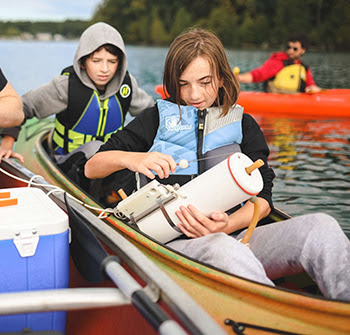$1.6 million in grant funding available for fisheries and aquatic resources
 |
Project preproposals are due Nov. 12
|
The Michigan Department of Natural Resources is offering nearly $1.6 million in funding for a variety of activities tied to improving state fisheries and aquatic resources, including fish habitat conservation, dam removal and repair, resource assessment studies and providing access to recreation. Distributed through three themes – aquatic habitat conservation, dam management, and aquatic habitat and recreation in the Au Sable, Manistee and Muskegon river watersheds – Fisheries Habitat Grant funding is available through an open, competitive process to local, state, federal and tribal governments and nonprofit groups. “Healthy waters benefit all of us. Whether it’s better fishing, more resilient ecosystems or improved human safety, these projects have positive effects across Michigan,” said Joe Nohner, a resource analyst with the DNR Fisheries Division. “These grants help our partners protect and rehabilitate fisheries and waters in a state that relies heavily on those resources as a foundation for tourism and quality of life.” Examples of proposed projects addressing the causes of habitat decline include efforts to:
Grant and application guidelinesGrant applicants may apply for and receive funding from all three themes with one application, if eligible for each. Expected funding is derived from three sources, which are:
Applicants have the option of requesting funding from the current funding cycle or a conditional commitment from a future year’s funding. Conditional commitments to very competitive projects allow recipients to leverage DNR contributions toward applications for additional funding sources for larger projects or secure a funding commitment based on other conditions. The available funding advertised in this announcement does not include $257,817 in existing conditional commitments the DNR has made to partners from this year’s grant funding. Grant amounts start at a minimum of $25,000 and have the potential to be as large as the total amount of funding available in all theme areas for which a project is eligible. If necessary, smaller projects within the same region addressing similar issues can be bundled into a single grant proposal package to reach the minimum grant amount. The DNR identifies specific priority projects, through its Fisheries Priority Habitat Conservation Projects list, that will receive preference during proposal review. Applications for projects on this list still will need to be competitive in other aspects, such as cost, appropriate methods and design, and applicant expertise, so grant awards are not expected to exclusively fund projects on this list. In previous grant cycles, about 40% of all funded projects were Fisheries Priority Habitat Conservation Projects. All applicants must first discuss their project with a fisheries biologist, then complete and submit a short preproposal for DNR review. Preproposals must be submitted by email to Chip Kosloski at KosloskiC3@Michigan.gov no later than Nov. 12. Applicants will be notified of the outcome of their preproposal by Dec. 14 and, if selected, will be invited to submit a full application. An invitation to submit a full application does not guarantee project funding. Final funding announcements are expected to be made by May 31, 2022. The detailed program handbook, including timeline, preproposal guidelines and forms are available at Michigan.gov/DNRGrants. |


 Advertising
Advertising